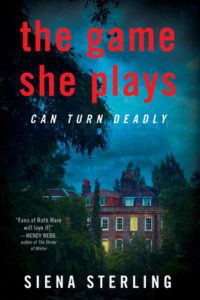Siena Sterling has combined some time-tested fiction tropes in her new quasi-suspense novel: the fish-out-of-water, posh country house gatherings with some kind of accident, the femme fatale, and a woman worried she’s not good enough for her lover. The results are uneven despite the surprise at the end.
It’s 1980 and after a bad breakup, Nicola leaves benighted Buffalo for Paris but is easily swayed on board her flight by a charming Englishman, James, to spend time with him in the south of France. She’s so naive and unworldly that she wonders if there’s a bakery in his village because one of her goals in life is to eat a flaky croissant. Sterling misses a chance to offer readers something special when Nicola and her boyfriend visit the southern French town of Uzès and there’s no description of its cathedral, the duke’s castle, or the lovely arcades.
The pair go off to a country manor in England to spend a shooting weekend with James’s friends where Nicola is astonished and humbled nonstop. His friends all went to Cambridge together! How does she know which fork to use at dinner! Brits can be snide! Why hasn’t she seen the cook! Three-course meals are exotic! The hosts will someday have titles of nobility! They already have servants!
But for all her cluelessness, Nicola can somehow imagine the most attractive woman in the group would be more fitting in a “salon entertaining French philosophers and Russian novelists.” That seems too sophisticated an observation for Nicola the way she’s been written.
As for the femme fatale, she’s repeatedly called beautiful and stylish, but she comes across as a run-of-the-mill narcissist, so whatever schemes she has in mind (remember the title) are painfully obvious.
Jealous of this woman’s acrobatic skill during a stupid parlor game after dinner, Nicola actually jumps onto a glass table and humiliates herself despite being uninjured amid all the broken glass. That reaction makes sense, but she’s so shame-bound and clueless through the book that it feels like overkill–and even worse, she’s not the only hapless female in the book.
The English shooting weekend is marred by someone getting shot (of course), and there’s also a mysterious rich German present who’s so quickly whisked off-stage you wonder why the author bothered. A second shooting weekend up in Scotland is more dramatic, but it takes way too long to arrive and there’s a clichéd taunting speech by the book’s villain.
The book’s title is a partial misdirection and that’s where the surprise comes in which is arguably the book’s best moment. Unfortunately, the prose is bland, the settings aren’t vivid enough, and the characters lack depth. For an unforgettable English house party novel, try Ruth Ware’s In a Dark, Dark Wood or Isabel Colegate’s classic The Shooting Party. Both are tremendous reads. ★★
Lev Raphael was the longtime crime fiction reviewer for the Detroit Free Press and has also reviewed for the Washington Post, Jerusalem Report, and several public radio stations. Guests on his interview show included Erica Jong and Salman Rushdie.


![Assault with a Deadly Lie: A Nick Hoffman Novel of Suspense (Nick Hoffman Mysteries Book 8) by [Lev Raphael]](https://m.media-amazon.com/images/I/61sFANnPq-L.jpg)